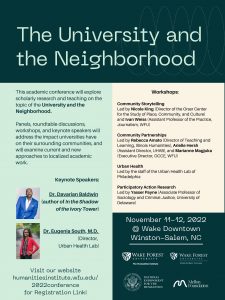WFU to host ‘The University and the Neighborhood’ conference
 The University and the Neighborhood Conference, co-hosted by the Wake Forest University Humanities Institute and the Office of the Dean of the College, will take place on Friday and Saturday, Nov. 11-12, at Wake Downtown.
The University and the Neighborhood Conference, co-hosted by the Wake Forest University Humanities Institute and the Office of the Dean of the College, will take place on Friday and Saturday, Nov. 11-12, at Wake Downtown.
The conference is the culmination of the 2018 Mellon Grant for Engaged Liberal Arts. The event will showcase work on engaged research and teaching accomplished by Wake Forest faculty and Winston-Salem community partners. The conference will also explore ongoing and new work on engaged research and teaching at our neighboring universities and from around the country, examining how and why this work matters, and why it matters to get it right.
As a precursor to the conference, on Wednesday, Nov. 2, from 4:30 – 5:30 p.m. in Pugh Auditorium, Wake Forest Provost Michele Gillespie will moderate a discussion on Black experience in segregated Winston-Salem. Distinguished scholars Elizabeth Herbin-Triant, associate professor of Black Studies at Amherst College and author of Threatening Property: Race, Class, and Campaigns to Legislate Jim Crow Neighborhoods (2019) and Wanda Hendricks, distinguished professor emerita of history at the University of South Carolina, author of The Life of Madie Hall Xuma: Black Women’s Global Activism during Jim Crow and Apartheid (2022) will participate in the talk.
The conference includes two public talks.
Friday, Nov. 11, at 6 p.m.
Wake Forest Biotech Atrium
Davarian Baldwin, the author of In the Shadow of the Ivory Tower, will discuss his research and findings on the economic and cultural relationships between universities and local area neighbors.
Saturday, Nov. 12, at 9 a.m.
Wake Downtown building in the auditorium (Room 4208)
Dr. Eugenia South, an emergency room physician and public health researcher, will discuss how small, localized improvements in neighborhood greenspaces can yield significant public health outcomes. Dr. South and her team from Philadelphia’s Urban Health Lab will also lead a workshop based on their findings on the second day of the conference.
Other workshops offered at the conference include sessions on forming community partnerships, community storytelling, and participatory action research. Visit the University and the Neighborhood Conference website for more information, including registration links, the full conference schedule, speaker and participant bios, and complete workshop descriptions and signups.
Categories: University Announcements
